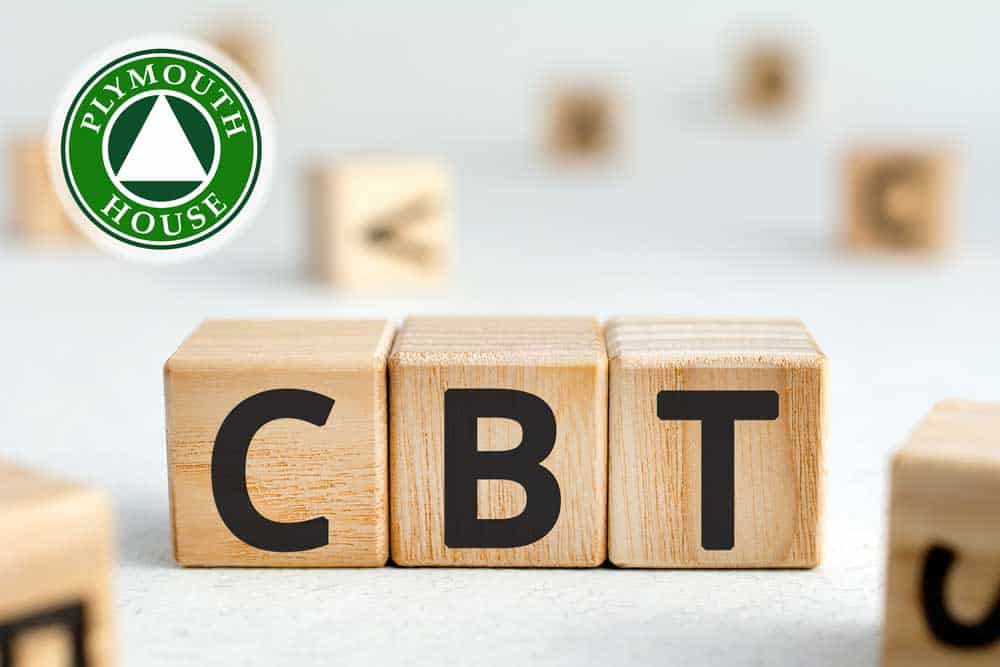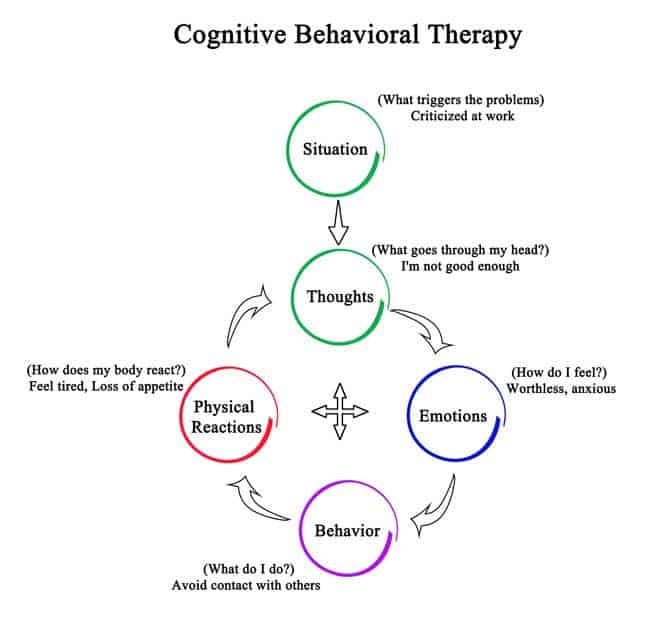
Addiction Treatment
Cognitive Behavioral Therapy
At The Plymouth House we are a big believer in teaching Cognitive Behavioral Therapy (CBT) to help our guests learn to have power over their thoughts, emotions and behaviors.
What is Cognitive Behavioral Therapy (CBT)?
Cognitive Behavioral Therapy is a form of psychotherapeutic treatment that has been heavily researched and proven effective for the treatment of substance abuse and many co-occurring mental health conditions. CBT has been proven to improve cognitive functioning while leading to an overall better quality of life. CBT is based on several core principles, which revolve around the impact that negative thought patterns and subsequent behavioral patterns have on the way that people function and interact with the world around them.
The core principles of Cognitive Behavioral Therapy include:
- Psychological issues are at least partially dependent on negative and self-destructive thinking patterns.
- Psychological issues are at least partially based on unhealthy behavioral patterns.
- People who are struggling with psychological issues can learn healthy and effective ways of coping, which will in turn help reduce their symptoms and contribute to a better quality of life overall.
Methods used in Cognitive Behavioral Therapy to treat addiction include:
- Helping guests identify how distorted patterns of thinking have been impacting them negatively. Guests uncover what messages they tell themselves on a regular basis, and how these self-destructive messages affect their day-to-day lives.
- Helping guests evaluate how negative thinking patterns continuously cause issues in their lives, and learn to look at these patterns of thinking in an objective light.
- Helping guests identify negative behavioral patterns, and helping them better understand the connection between thinking and behavior.
- Helping guests develop the problem-solving skills and healthy coping mechanisms that are essential to staying sober and avoiding relapse.
- Helping guests develop a sense of self-confidence and self-esteem. Guests learn that they can improve their own lives by changing the ways in which they think and behave, which helps them build a vital sense of confidence in their own abilities.
- Helping guests learn how to face their fears head-on rather than avoid them.
- Teaching guests certain coping mechanisms geared towards quieting the mind and working through uncomfortable emotions in a healthy and productive way.
- Using role playing techniques as a way to map our potential interactions with others.
Rather than focus on past events, CBT helps guests focus on the present moment and work through the challenges they are currently facing.Guests learn how to think themselves through difficult situations . The mind is a powerful tool. Our thoughts generally become our moods, and our moods influence our actions. By controlling our thoughts, we can thus have power over the intensity of our emotions and subsequent actions. This skill is essential when it comes to maintaining long-term sobriety and not letting our emotions sabotage our success.
THOUGHTS >> EMOTIONS >> ACTIONS
We Are Here For You
Let Us Help You Heal
Our Drug & Alcohol recovery services are second to none.
Learn how we can help by speaking with one of our Treatment Advisors today.
Benefits of Cognitive Behavioral Therapy
The benefits of teaching Cognitive Behavioral Therapy at The Plymouth House include:
- Guests work one-on-one with a licensed therapist and participate in group therapy sessions that revolve around CBT. This helps them recognize that they are not alone in their negative thinking patterns, and that there are other people they can safely talk to about them.
- CBT helps reduce the negative thinking patterns that keep many people stuck in their old ways. Guests learn to replace unhealthy and self-destructive ways of thinking with positive and productive thoughts.
- CBT helps bolster self-esteem by helping individuals realize they have more control over their thoughts, emotions and actions than they thought they did. Guests learn self-confidence by facing challenges repeatedly and successfully overcoming them.
- Guests learn to communicate in healthy and productive ways. CBT helps with the development of communication skills.
- CBT greatly helps individuals cope with uncomfortable emotions — like anger — in healthy ways. Many people who remain engaged in CBT find that this therapeutic method is highly conducive to anger management.
- CBT is an excellent tool for relapse prevention. Guests learn how to identify and work through their own personal relapse triggers.
The benefits and efficacy of Cognitive Behavioral Therapy have been studied for decades. An article published by the US National Library of Medicine titled, “The Efficacy of Cognitive Behavioral Therapy: A Review of Meta-analyses,” explores the benefits of CBT compared to other popular therapeutic methods. The article reads, “Eleven studies compared response rates between CBT and other treatments or control conditions. CBT showed higher response rates than the comparison conditions in 7 of these reviews and only one review reported that CBT had lower response rates than comparison treatments. In general, the evidence-base of CBT is very strong.”
Our Drug & Alcohol Treatment Services Include
CBT & the Fourth Step of Alcoholics Anonymous
Cognitive Behavioral Therapy and the Fourth Step of Alcoholics Anonymous are highly related
CBT has quite a lot in common with the Fourth Step of Alcoholics Anonymous. The Fourth Step is to make “a searching and fearless moral inventory of ourselves.” For this step a person creates a list of all of his or her resentments and explores why he or she was initially hurt. Fears are also explored thoroughly, as well as our sexual conduct and hurtful behaviors. In writing out stories from our lives and asking ourselves honestly what part we played in those stories, we become aware of certain patterns and skewed perspectives that have continually caused us problems. By seeing these patterns, and then attempting to re-write the meaning we give to our stories, we are essentially practicing Cognitive Behavioral Therapy.
There is a specific tool commonly utilized in CBT that is quite similar to this process. In CBT, this exercise is called “thought records.” Guests are asked to keep track of the thoughts and behavioral patterns they have, then explore them in a therapeutic setting. This exercise helps guests build awareness around the way they respond to external stimuli, the way they speak to themselves and the ways in which they communicate with others. Healing cannot occur unless false beliefs about oneself are brought to the surface, acknowledged and reframed. The Fourth Step of Alcoholics Anonymous likewise identifies and addresses the character defects that might be keeping an individual stuck in the same cyclical patterns.
Ready To Begin Your Drug & Alcohol Treatment?
We Offer A Safe & Effective Program
Don’t let Drug & Alcohol addiction control your life.
Call us today and let’s get you started on the path to a better you.
The Additional Therapeutic Services We Provide
In addition to Cognitive Behavioral Therapy, The Plymouth House utilizes a number of other therapeutic methods shown to be helpful in healing addiction and preventing relapse. These include:
- Dialectical Behavioral Therapy
- Motivational Interviewing
- Eye Movement Desensitization and Reprocessing (EMDR)
- Individual and Group Therapy
- Family Therapy
- Recreational Therapy
- Guided Mediation & Yoga
- Fitness & Nutrition Therapy
- Life Skills Workshops
Begin Healing Now!
Have A Call With One Of Our Treatment Advisors
Don’t Suffer Any Longer
Begin Your Recovery Journey
The moment you make the decision to contact us, our experienced team of Treatment Advisors will be available to assist you. They will personally work with you from your first contact with us until you arrive at The Plymouth House. We know that in most cases guests and their families have a myriad of questions regarding treatment options, costs, facilities and admissions details. With one phone call we will assist families and individuals in making the right choices for their individual situation.

















